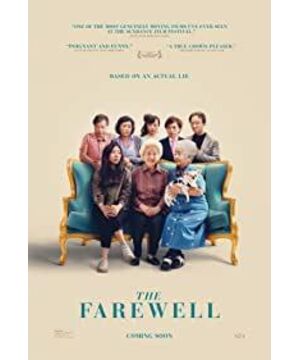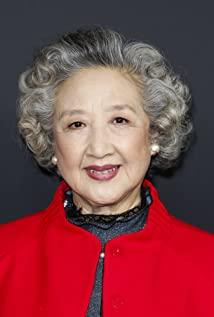"Don't Tell Her", the original English name is "The Farewell", literally translated as "Farewell", but after watching the film, I think the Chinese title is more appropriate and more meaningful. The story is as simple as one sentence. The grandmother was diagnosed with a serious illness, and the family decided to hide it, but the granddaughter who grew up in the United States felt that she should be told, which triggered a series of episodes. I believe that most ordinary people have experienced life and death to some extent in their lives so far. And some people may also face the same problem-when a loved one suffers from an incurable disease, should they choose to tell them to face life and death or to conceal the illness so that they can spend the last time with peace of mind?
The story of this film comes from the personal experience of director Wang Ziyi. Like the heroine in the film, she followed her parents to the United States at the age of six and grew up in Western culture. When a "Western youth" collides with the concept of an "Oriental family", the thinking that arises is naturally controversial.
But unlike expected, the rhythm of the whole film is calm and soothing, and even some passages will feel straightforward and almost "boring." Those things that are accustomed to our lives are recorded in detail by the camera, which makes people have to look back and examine.
Round table, the best bearing and expression of the relationship between Chinese people
The first family dinner was at the round table in the living room of grandma's house. The family members who had not been together for many years had their own thoughts and smiled.
The grandmother sits on the left hand side of the younger son's family, and on the right hand side sits the grandson Haohao and the Japanese daughter-in-law who is about to enter the door. This marriage of Haohao is an opportunity for the family to reunite. They didn't plan to get married so soon, they had to make a little compromise and sacrifice for this secret lie.
Grandma's happiness was beyond words, and she kept talking about everyone eating and drinking. She even prepared the pumpkin pancakes that granddaughter Bi Li liked the most when she was a child. And Bi Li, who was brought up by her grandma since she was a child, is also the most concerned person at the dinner table. She couldn't understand why her parents and relatives made such a consistent decision to conceal the illness. Isn't it possible that a person cannot have the right to say goodbye at the end of life? Why can you make decisions for others as a relative?
For the second family dinner, the location was changed to a restaurant, and the attendees had an aunt and daughter's family. Since the eldest son's family lives in Japan and the younger son's family lives in the United States, the younger aunt is mainly responsible for taking care of the grandma in daily life, and her daughter has also contributed a lot.
I believe that after watching this scene, many people will think of the scene of returning home during the Spring Festival. The relatives who have not seen me for a year are sitting at the round table in harmony. Do you have a boy/girlfriend? Have you given birth? What's the salary now? Are you ready to have a second child? What school is the child planning to apply for? Every problem is deadly, reminding you of the pressure of survival that you cannot ignore.
On this round table, the hostess’s mother and the aunt’s daughters also come and go, chatting from education to income, from life ideals to social reality, with smiles on the surface, but swords and swords on the inside. Bi Li, who is already in her early 30s but still living a part-time job abroad, received another rejection letter from an art institution, not knowing where the future is. And the cousin who is about to start middle school life, may embark on the road of studying abroad arranged by parents, and then? neither knows.
This round table drama that reflects the typical contemporary family relationship in China is not an exaggeration to say that it is the “eyeball” of this movie.
For the third dinner, the scale was even bigger, with dozens of tables beating the gongs and drums. This wedding, organized by grandma herself, invited all the relatives and friends in the hometown who knew each other well. On the stage, the emcee, the bride and groom, Bi Li and her father appeared in turn, and the mission was not completed unless the audience climaxed.
In the second half of the game, everyone began to relax a little bit. The main table began to play small games to invigorate the atmosphere, and if you lose, you will be fined. The groom Haohao, who had drunk many glasses of wine in a daze, couldn't help crying in the end.
Joy and sorrow are intertwined, it seems that at this moment, they have reached inner reconciliation and relief.
Western curiosity perspective or neglected reality?
"Don't Tell Her" can be said to be the most successful Chinese film in recent years, from the shooting project to the box office reputation after its release. Different from last year's "Golden Romance", from the story to the lineup, and even the language use, it is a true oriental story, which has poke the hearts of many Chinese descendants. But at the same time it has also brought many doubts. Is this film still a typical curious movie made for Westerners? Even, is there a deliberate vilification of the domestic side?
And aside from curiosity, this is actually more of a film with strong personal memories of the director, but this memory has a lot of empathy, which will trigger waves of discussion.
From the big health care arranged by relatives as soon as we return home, to the crying troop we met when we went to the grave for my grandfather, to the absurd and funny photo shoots in the photo studio, these are all common scenes in our lives. But when these scenes collide with family members who have returned from abroad, the embarrassment, bitterness, and funny chemical reactions caused by them may be the truth that the director wants to express.
The grandmother's condition was the beginning of this series of things. At this time, it is no longer the focus of the film, and even telling her is no longer the most tangled point of the heroine. This trip back home reminded her more of the time she spent with her grandparents when she was a child, the love of her parents that was missing at that time, and the emotional emptiness that had been formed in her heart for so many years.
The identity of Chinese descent has always puzzled her, and she is destined to not become a mainstream group abroad, and when she returned to China, she found that the roots seemed to be gone. The tall buildings all over the city have no trace of childhood, and the question at the front desk of the hotel about "China or the United States is better" is also unanswerable. In the end, she could only return to the United States on time within the scheduled itinerary to continue her life.
View more about The Farewell reviews











